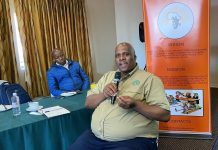Africa-Press – Eswatini. School meals are not just a safety net, they are a strategic investment in human capital and national development.
This was the message from a representative of the World Food Programme (WFP) headquarters in Rome, during a presentation on the opening day of the SABER School Feeding (SABER-SF) National Workshop, currently underway at The George Hotel in Manzini.
Peter Haag, a global expert from WFP Rome, delivered a comprehensive overview of the SABER-SF methodology, which stands for Systems Approach for Better Education Results, School Feeding.
The two-day workshop brings together local and international stakeholders to assess Eswatini’s current school meals programme and identify clear pathways to strengthen it.
“Food in schools is not just about preventing hunger, it is about productivity. Without food, learners cannot focus, they cannot learn, and they cannot achieve their full potential,” said Haag.
He explained that the SABER process is designed to help governments evaluate the strength of their school feeding programmes across five critical areas: policy and regulation, institutional coordination, financial capacity, programme design, and community involvement. These, he said, form the backbone of a resilient and sustainable school meals system.
“This is about more than school meals,” Haag told participants.
“This is about building systems that support children, families, and even local agriculture. When done right, school feeding stimulates local economies and strengthens education outcomes.”
Haag also highlighted the Home-Grown School Feeding model, which he said can generate multiple benefits, from improved nutrition and school attendance to increased demand for climate-smart crops, better access to local markets, and even reductions in child labour and early marriages.
Day one of the workshop was marked by high-level participation and intense engagement. Haag led group discussions and technical sessions that allowed stakeholders to reflect on the current achievements of the school feeding programme, while also identifying gaps that need to be addressed in Eswatini’s upcoming capacity strengthening strategy.
Using the SABER methodology, the groups explored challenges such as funding bottlenecks, policy fragmentation, limited community involvement, and the need for better monitoring systems.
Participants worked in teams to propose actionable solutions, many of which will be included in the upcoming Healthy SABER Report and National Capacity Strengthening Strategy being developed as part of the ongoing review.
The national workshop, hosted by the Ministry of Education and Training and supported by WFP, follows months of technical preparations, including desk reviews and consultations across government and development sectors.
Eswatini becomes one of the few countries in the region to adopt the full SABER-SF process as a baseline for long-term system reform.
On the same day, Senior Inspector Nutrition Thobile Gamedze revealed that over 340 000 learners in 921 public schools, including 582 primary and 339 secondary schools, are currently benefitting daily from the government’s National School Feeding Programme, which aims to boost enrolment, attendance, and learner performance.
As the day closed, Haag reaffirmed WFP’s commitment to working hand-in-hand with Eswatini in building a school meals system that is efficient, inclusive, and sustainable.
“The SABER process helps you see where you are, where you want to go, and how to get there. It’s about planning with purpose,” he concluded.
The workshop continues with more technical sessions and presentations expected to shape the next chapter of school feeding in Eswatini.
For More News And Analysis About Eswatini Follow Africa-Press







